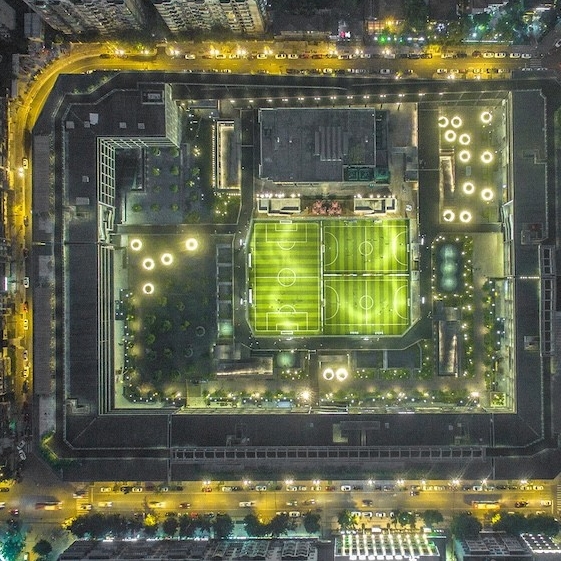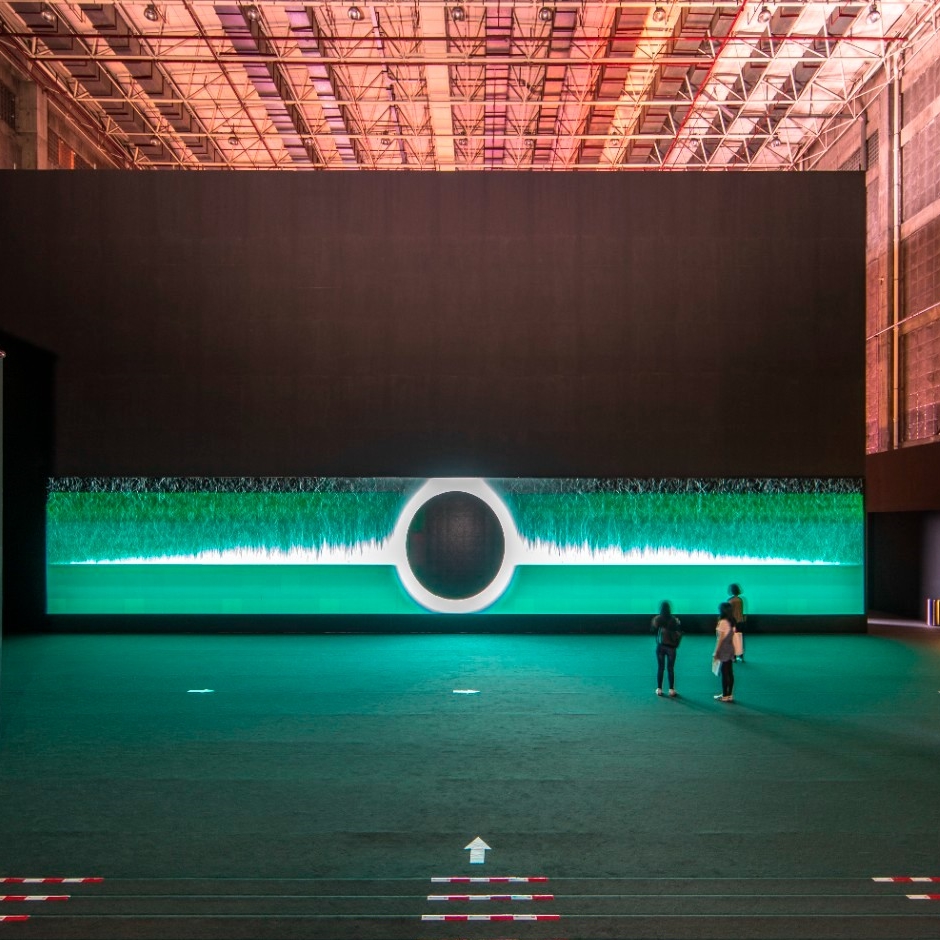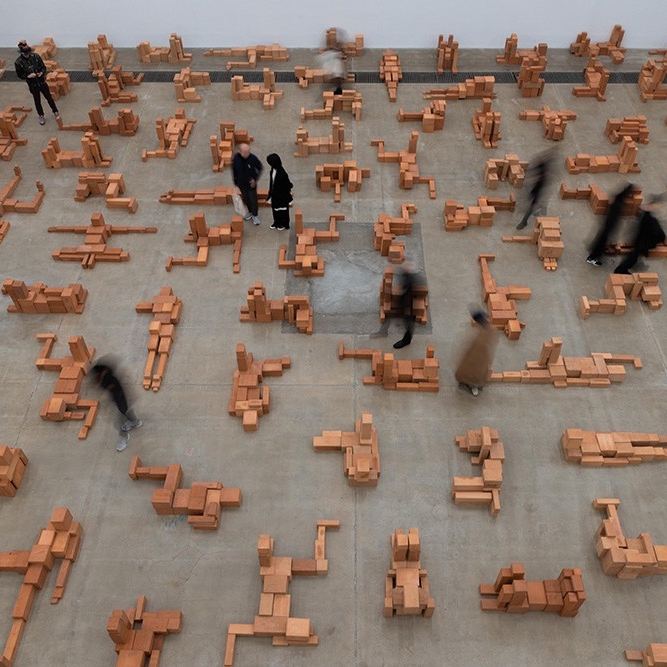Like most people, I was constantly admonished to “establish far-reaching ambitions”, “realize my self value” and “struggle to change my destiny” since I was a child. Full of fantasies about the future, I tirelessly strived for these goals. I had faith that all of my efforts would be rewarded one day.

Cai Zhisong' Studio
In a time of great social flux, where decades of social upheaval have contributed to a frequently contradictory cultural identity, Cai Zhisong’s sculpture looks back to the stability of the past. His is not a banal reiteration of Chinese history however, but a reaffirmation of the past and its relevance to contemporary times. Cai entitles his series ‘Motherland’, a word which is synonymous with pride and nationalism. As we shall see however, the themes in his work cannot be limited to one nation and are universal in nature.Whether figurative or not, an ongoing concern with time pervades all of Cai’s works and is coupled with an awareness of the change that accompanies it. What is of particular interest to the artist, however, is that which does not change; the unerring presence of human emotion, and in particular the existence of suffering.
In looking at Cai Zhisong’s warriors one is given an immediate impression of the hardship that they appear to endure, this being particularly evident when gazing at the nude figures in the ‘Ode’ series. We see their strong, physical bodies being slowly crushed by an intangible, indecipherable weight. This inner torment is something that relates to all of us, as Cai states: “Pain is universal, no matter who you are, everyone feels pain at some point.” This has, of course, held true throughout history, with external phenomena constantly changing, but the same emotions continuing to exist. Cai is acutely interested in the individual’s response to emotional pain and the way in which the intensity of the emotion varies depending upon the manner that one chooses to deal with it. Certain situations, without doubt will cause negative emotions, but Cai argues that it is necessary for one to realise that no one event can be held responsible. As he sees it, the cause of significant pain is a collection of small events that combine to become forceful enough to have an adverse effect upon the subject. It is possible, therefore, to dismantle the causes that precipitate pain and observe them not as a severe whole, but as a gradation of lesser events. When this has been achieved, and the causes have been fractioned and worked into their smallest possible components, the events, now seen in isolation, appear insignificant enough to seem nonexistent. When it is also remembered that situations in the world are never constant, it is possible to perceive these negative feelings as being irrelevant. This process, although possessing the potential to relieve suffering, is not, as Cai states, one which comes naturally to people, and as such, many allow their suffering to consume them. This occurs when pain is left unchecked. It perpetuates itself, continuing in an unrelenting cycle that becomes increasingly difficult to break free from and as this happens, we become further removed from the foundations of our distress and are left only with the negativity that it has engendered. We can see this state, this continual cycle of torment, represented in Cai’s warriors who, like many others, are trapped in an interminable state of suffering.
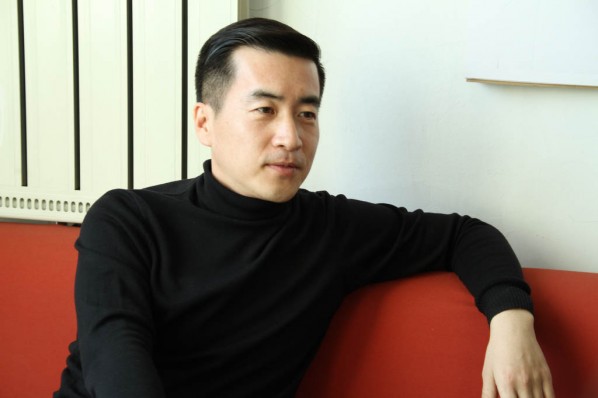
Cai Zhisong
Cai has given these theories on pain and its nonexistence much time and consideration, incorporating his ideas into his work and continuing to explore the theme in his various forms. They are ideas which were briefly touched upon by Confucius, but Cai is careful not to portray himself as a philosopher. Rather, he puts his care and attention into his painstaking processes, creating compassionate works that capture the innate suffering of the world. Our observations of his insightful and visually striking sculptures leave one feeling emotionally affected and contemplative. These reactions are brought about in such a subtle and gentle manner however, that one is never quite sure what it is that has touched them. In his finely articulated works we see Cai proudly but sensitively continuing the legacy of an ancient Chinese culture, whilst also reminding us of the universal qualities that tie everyone and everything, including the past and the present, together.
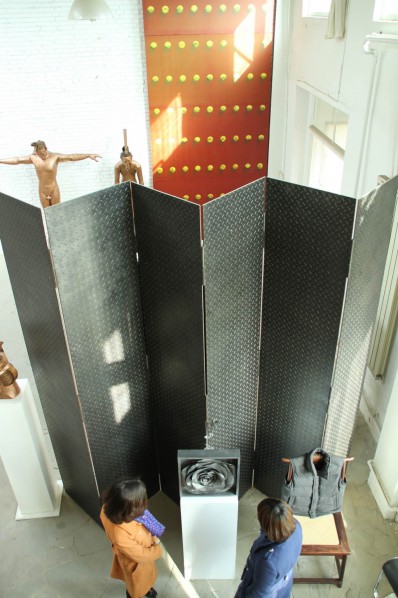
Cai Zhisong' Studio
BIOGRAPHY
1972 Born in Shenyang, Liaoning, China
1997 Graduated from Central Academy of Fine Arts, Sculpture Department
2001 Obtained Post-graduate diploma from Central Academy of Fine Arts
1998-2008 As a teacher of Central Academy of Fine Arts, Sculpture Department
Solo Exhibitions
2003 Motherland-Cai Zhisong Solo Exhibition, Belgium Embassy, Beijing, China
2004 Motherland-Cai Zhisong Solo Exhibition, Art Scene Warehouse, Shanghai, China
2005 Motherland-Cai Zhisong Solo Exhibition, La Ke’er Art Center,Beijing, China
Motherland-Cai Zhisong Solo Exhibition, Highland Gallery, Beijing, China
2006 Motherland-Cai Zhisong Solo Exhibition, SHiNE Art Space, Shanghai, China
2009 Motherland-Cai Zhisong Solo Exhibition, China Square NY, New York, USA
Cai Zhisong Solo Exhibition, See+ Gallery, Beijing, China
2010 Motherland-Cai Zhisong Solo Exhibition, Ming Art, Taiwan
Motherland and Rose- Cai Zhisong Solo Exhibition, Triumph Art Space, Beijing, China
2011 Cai Zhisong Solo Exhibition, National Museum of Indonesia, Jakarta, Indonesia
Cai Zhisong Solo Exhibition, Ode To Art Contemporary, Singapore
Cai Zhisong Solo Exhibition, Regensburg Museum, Germany
Group Exhibitions
1998 The 1st Group Exhibition of Young Sculptors in Beijing, Central Academy of Fine Arts, Beijing, China
1999 Sculpture Exhibition of Eight Young Artists, Contemporary Art Gallery, Beijing, China
The 9th National Art Exhibition, National Art Museum of China, Beijing, China
2000 Invitational Sculpture Exhibition, Changchun, China
55th Anniversary of Victory Against the Japanese, Central Academy of Fine Arts, Beijing, China
2001 Chinese Contemporary Art Touring Exhibition, Europe
Exceptional Sculpture Exhibition of International Fine Arts Presidents
Forum, Central Academy of Fine Arts, Beijing, China
2001 Westlake Invitational Exhibition, The Westlake Art Museum, Hangzhou, China
Paris Autumn Salon, Eiffel-Branly, Paris, France
2002 Professor’s Sculpture Show, Central Academy of Fine Arts, Beijing, China
2003 Today’s Chinese Art Exhibition, China World Art Museum, Beijing, China
Sculpture Exhibition, Beijing, China
International Environmental Art and Sculpture Exhibition, Shanghai, China
The 1st Beijing Biennale, National Art Museum of China, Beijing, China
Changing Directions The 1st Invitational Exhibition of Contemporary Art, Chongqing Art Museum, Chongqing, China
Multi-Focus, Art Scene Warehouse, Shanghai, China
2004 Young Professors Show, Central Academy of Fine Arts, Beijing, China
Middle Space Between the World and Paradise, Chongqing, China
60s to 70s Group Exhibition of Outstanding Young Chinese Artists, Today Art, Beijing, China
China, Imagination China Contemporary Sculpture Exhibition,
Palaise Du Louvre Square, Paris, France
Celebrating the 55th Anniversary of the People’s Republic of China,
National Art Museum of China, Beijing, China
The 10th Annual Art Exhibition, National Art Museum of China, Beijing, China
La France Mandarine, Hong Kong, Shanghai, China. Paris, France
Art Cologne 2004, Cologne, Germany
Invitational Exhibition Asian Art Exhibition, Frey Norris Gallery, San Francisco, USA
Chinese Contemporary Sculpture Exhibition, Brussels, Belgium
2005 Installation & Sculpture Exhibition, Kennedy Art Center, Washington D.C., USA
Open Spaces Sculpture Exhibition, Beijing LOFTEL, Beijing, China
Cai Zhisong, Feng Feng Duo Exhibition, Art Scene China, Shanghai. China
Group Exhibition Chinese Artists, Reed Savage Gallery, Miami, Florida, USA
Open Spaces, CBD Art Space, Beijing, China
Passion and Force Group Exhibition, Yan Club Art Center, Beijing, China
2006 1st China Document, China World Art Museum, Beijing, China
China-Korea Art Exchange Show, 3818 Cool Galley, Beijing, China
Chinese Contemporary Sketches Exhibition, Beijing/Hangzhou/Guangzhou/Shenyang, China
The Red Flag, 798 Factory, Beijing, China
2007 Invitational Exhibition of Contemporary Sculpture, 798 Factory, Beijing, China
2008 The Return Imagination, See+ Gallery, Beijing, China
The Floating Art, Beijing, China
Changes, DR Gallery, Beijing, China
2009 CISAE 2009, Beijing, China
The 1st Youth Art Biennale in Chongqing, Chongqing, China
Revival of Tradition-Mountain and River/ Text/ Memory Frankfurt Book Fair, Frankfurt, Germany
Print Exhibition of Chinese Contemporary Artists, Chongqing, China
Our Love-Opening Show of Yan Gallery, Shanghai, China
Northeast Hotpot-1st Show of ACEA 2009, La Ke’er Art Center, Beijing, China
2010 Sharing with Classic, Beijing China
Passing Territory-Chinese And Foreign Masters Fine Print Exhibition
798 Art Bridge Gallery, SanBan Studio, Beijing, China
2011 Chinese Pavilion at the 54rd Venice International Biennial, Venice, Italy
Black white, 0 Zero Art Museum, 798 Factory, Beijing, China, Honor & Prize
1997 Obtained Gangsong Family Fund Award
2000 Obtained Gold Prize at the 55th Anniversary Exhibition of the Victory Against the Japanese
2001 Obtained the Taylor Prize at the Paris Autumn Salon
Obtained Outstanding Work Prize at the Hebei International Invitational Sculpture Exhibition
2003 Obtained Outstanding Work Prize at the Fuzhou International Invitational Sculpture Exhibition
2004 Obtained the President’s Prize at Central Academy of Fine Arts
Obtained Bronze Prize at the 10th National Art Exhibition
Public collections (partial)
China National Museum of Fine Arts
Museum of the China Centra Academy of Fine Arts
CNC (Chinanews)
He Xiangning Art Museum, Zhejiang Art Museum
Chongqing Art Museum
Changchun Sculpture Art Museum
People’s Government of Changchun Municipality
People’s Government of Shijiazhuang Municipality
People’s Government of Yantai Municipality People’s Government of Jiaozuo Municipality
Belgian Embassy
Peking University research center of aesthetics
Westin Shanghai Hotels
Deutsche Bank-China
Greek Museum
Regensburg Museum, Germany
National Museum of Indonesia
National Museum of Singapore
Newark Museum (U.S.A)


